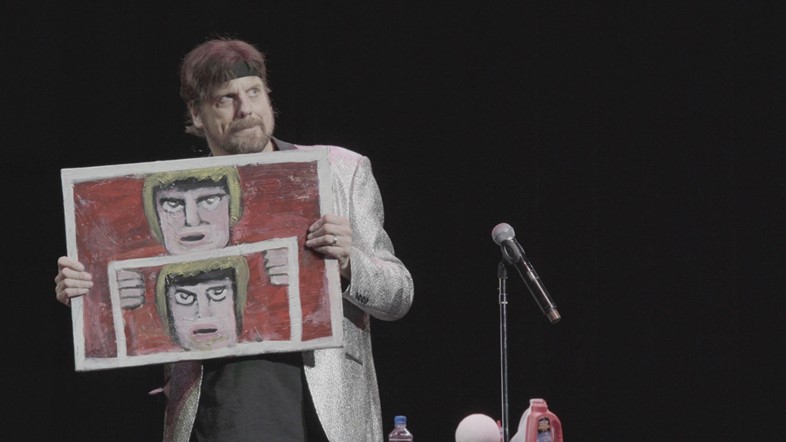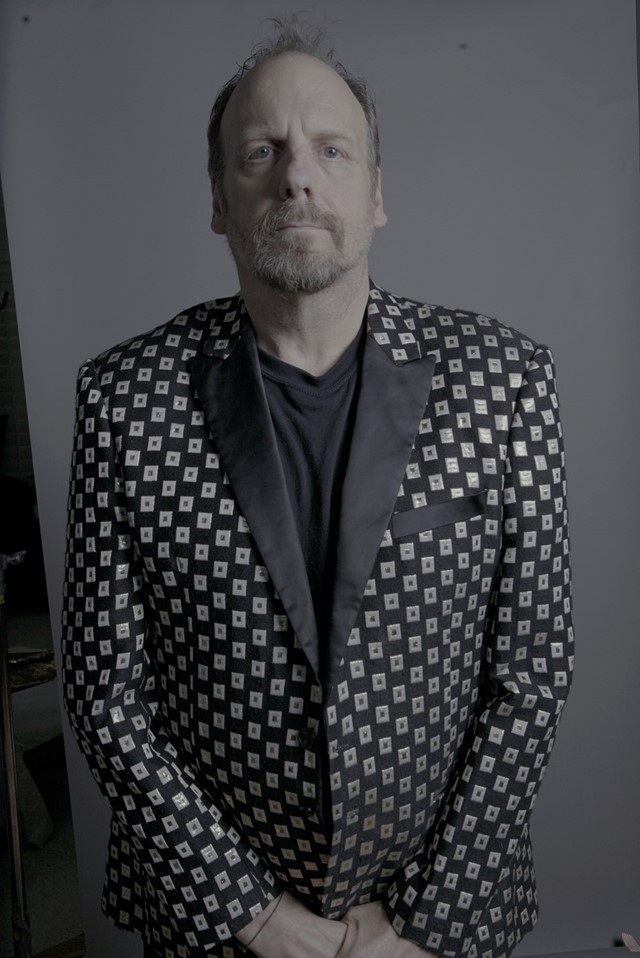Ben Berman, the director of The Amazing Johnathan Documentary, opens up to Thomas Curry about filming with magician John Edward Szeles for nearly two and a half years
- TextThomas Curry
“I did go mad, and not just on camera, tonnes of stuff behind the scenes too, with me just feeling like shit, being confused, not knowing what to do next,” says Ben Berman, when I ask him how he survived filming with magician John Edward Szeles – better known by his stage name The Amazing Johnathan – for nearly two and a half years while working on The Amazing Johnathan Documentary.
Much like Tim Wardle’s mind-bending Three Identical Strangers, it’s hard to describe The Amazing Johnathan Documentary without accidentally revealing the hidden feints, twists and turns that shape what is, without doubt, the most gloriously original documentary of the year. Captivating, surreal and wickedly dry, what begins as fairly standard documentary fare – establishing shots of Johnathan pottering about his home, archive tape to remind us of his early celebrity, a few famous talking heads sharing amusing anecdotes about their old friend – spirals into a quick-witted and highly meta commentary on the process of documentary-making itself. “This movie is a magic trick,” says Berman. “It’s literally structured like a magic trick. It starts off saying this is what it’s going to be about – even the title creates a preconceived idea of what it’s going to be – but then it ends up becoming something else. It morphs into a documentary about documentary-making and the weird desperate things that a filmmaker might do to come out on top.”

Though not a serious fan in any meaningful way, Berman, like most 13-year-old boys growing up in the 80s and 90s, absorbed the pranks and gimmicks of the self-described ‘Freddy Krueger of Comedy’ almost by osmosis. “Johnathan was everywhere,” says the director. “A lot of TV, a lot of Comedy Central specials.” While working on his own pilot for Comedy Central, Berman overheard stories about the magician’s drug abuse, his newly diagnosed heart disease and his subsequent decision to retire from performing. “That’s when the thought came to me. I remembered him being very funny and weird, now he’s facing mortality, I figured maybe there’s a movie there, maybe there’s something...”
From their first meeting Johnathan lived up to his reputation as a jokester. “We knocked on his door, he came to meet us looking really unwell, he had this walker and he was very, very low energy. He said, ‘Come on in guys...’ then two seconds later he threw the walker aside and said ‘Ah! I’m just fucking with you...’ He was totally fine.” Though he didn’t realise it at the time, that encounter would set the tone for the rest of their relationship. No matter how he tried, throughout filming Berman was constantly second-guessing his subject: “You never know what’s really going on.”

By the time the film reaches its conclusion we begin to realise that the way Berman has decided to tell Johnathan’s story, the decisions he makes about what to reveal and what to keep hidden, are all part of the illusion – it’s a perfect pairing of form and subject. “Johnathan’s magic act deconstructed magic,” says the director. “He messed with the form, he showed the seams of how each trick was done for comedic value. That was his act. It came off as mistakes and flaws and things not going well, but it was all intentional. This movie, the very structure of it, does the same thing, it deconstructs itself to create something new. We show the seams, we show the failures and in doing so, we go deeper. For comedic value at times, but also for deeper truths. This movie couldn’t have been done with another subject.”
While happy with the final result, it was a daunting and high-stakes process – deciding to create a movie which would attempt to mould and bend the form of documentary film-making itself. Berman was particularly hesitant about including elements of autobiography in the story. “My producer was like, ‘Oh! You should put that into the movie...’ And literally I was yelling, ‘No, no one wants to see more of my sob story, we’re not doing that, absolutely not.’” But then, a chance find of some old cassette tapes he’d recorded as a child changed his mind: “There’s no good explanation for why that one tape would end up in this small bag in LA. The moment that I saw the clip where I’m interviewing my dad eight months after my mum died I thought ‘Oh god! Okay, fuck.’” Such details, though perhaps painful to include, lend the film an emotional honesty that’s rare in features which are so entertaining.
Much like the best magic tricks, the ending of The Amazing Johnathan Documentary manages to be both completely mystifying and incredibly satisfying. The final scenes explain myriad mysteries, while also posing new questions to keep us guessing. “We wrap up as many things as possible, but when the credits roll, audiences leave the theatre with so much to talk about. Is it correct or ethical for a documentarian to enter their documentary? When does them entering the movie become manipulative more than truthful? What’s truth and what’s an illusion? Were they all in it together? What’s really going on?” Despite what Berman shows us to the contrary, The Amazing Johnathan Documentary is proof, if proof were needed, that a magician never reveals his tricks.
Louis Theroux will host a special Q&A screening of the film on 19 November, to be simulcast nationwide across the UK. https://www.tajdfilm.co.uk/











